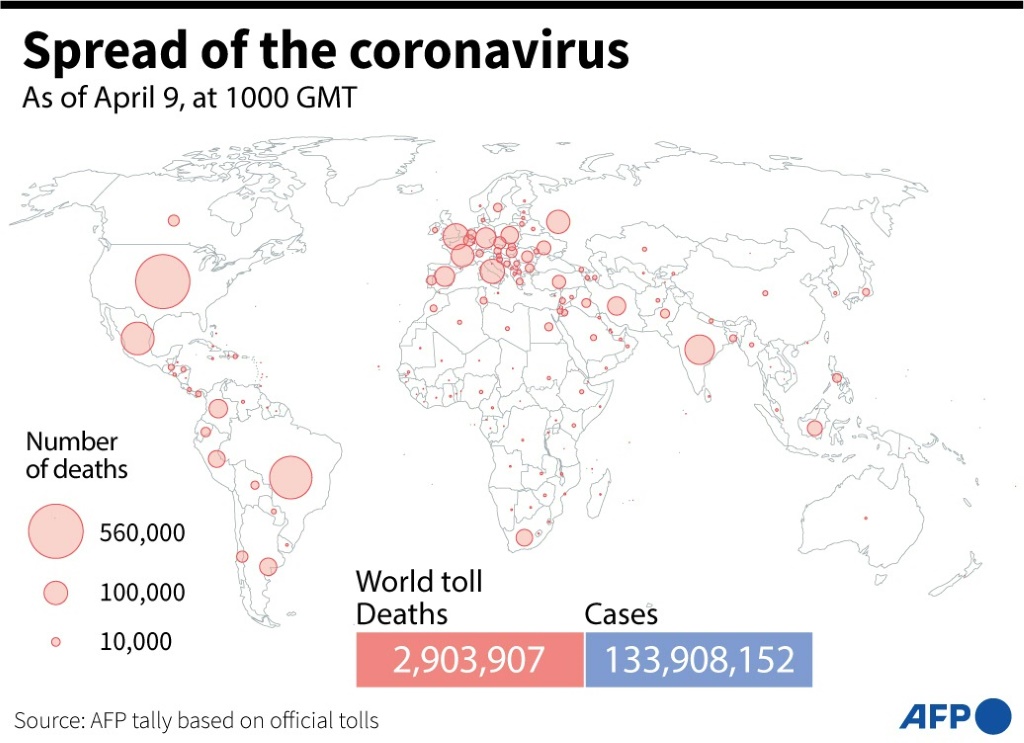Europe’s stuttering vaccine rollout faced multiple hurdles on Friday as EU regulators said they were reviewing side effects of the Johnson & Johnson shot and France further limited its use of the AstraZeneca jab.
The US drugs regulator said it had not found a “causal” link between the J&J vaccine and blood clots, but that its probe was continuing after “a few individuals” suffered complications.
Much of the world is still in the clutches of the pandemic that has killed 2.9 million people, from Brazil, where the virus is killing more than 4,000 people a day, to Japan where the government has tightened restrictions once again.
In India, the worst-hit state of Maharashtra is running out of vaccines as the health system buckles under the weight of the contagion. Home to megacity Mumbai, Maharashtra has been placed under a curfew and weekend lockdowns.
And across Europe populations are facing some of the world’s toughest anti-virus measures, yet the epidemic refuses to be curbed.
All of France is subjected to restrictions of some form, and the country has so far doled out jabs to more than 10 million people.
But it has repeatedly changed the rules on AstraZeneca’s vaccine, first over doubts about its efficacy, then over fears that it could be linked to blood clots.
On Friday it did so again, with Health Minister Olivier Veran saying citizens under 55 who had been given a first shot with AstraZeneca would be given a different vaccine for their second dose.
But shortly after he spoke, the World Health Organization said there was “no adequate data” to support switching Covid-19 vaccines between doses.
As Europe continues to reel from constant rows over AstraZeneca’s jab, the EU’s medicine regulator announced it would be probing a second jab over bloodclot concerns.
The European Medicines Agency (EMA) said four “serious cases” of unusual blood clots had been reported — one of them fatal — with the Johnson & Johnson vaccine, which uses similar technology to the AstraZeneca one.
The US Food and Drug Administration said it had found no “causal” link yet between the jab and clots.
But it noted “a few individuals” in the country had clots and low levels of platelets in the blood after receiving the vaccine, and its investigation was continuing.
“Both conditions can have many different causes,” the agency said.
Johnson & Johnson released a statement saying the company was aware that “thromboembolic events… have been reported with all Covid-19 vaccines”.
But the statement added: “At present, no clear causal relationship has been established between these rare events and the Janssen COVID-19 vaccine,” referring to J&J’s European subsidiary.
Both jabs are approved for use in the European Union but the J&J vaccine has not yet been rolled out, and various EU countries have stopped or limited the use of AstraZeneca.
Supply problem are also hampering vaccine rollouts.
India, which is one of the world’s leading manufacturers of vaccines, is suffering its own problems with jabs in Maharashtra, home to more than 100 million people and the economic hub Mumbai.
“Most hospitals in Mumbai will exhaust their supplies by the end of the day,” Mangala Gomare, who oversees the city’s vaccination programme, told AFP Friday.
In the United States, deliveries of the Johnson & Johnson vaccine are set to drop off sharply next week, US health authorities warned Friday.
Meanwhile Pfizer-BioNTech asked for authorisation to use their Covid-19 vaccine on 12-15 year olds in the US.
The companies said in a statement that they plan to make similar requests of other regulatory authorities worldwide in coming days.
In Europe, an AstraZeneca spokesman said half of its vaccine shipments to the EU will be delayed this week.
Swedish climate campaigner Greta Thunberg said Friday she would skip a forthcoming climate meeting in Britain because countries were unable to participate on even terms.
“With the extremely inequitable vaccine distribution I will not attend the COP26 conference if the development continues as it is now,” Thunberg told AFP.
Illustrating her point, Britain has so far given at least one jab to more than 31 million people, almost half of its population, compared with poorer countries like Mexico, which has administered fewer than 10 million jabs to only seven percent of its people.
Germany’s central government has tried hard to defeat the virus through restrictions on movement and commerce, but several states have torpedoed the strategy by refusing to go along with the proposals.
Now Berlin is changing the rules to gather more centralised power.
The proposed adjustments are likely to usher in night-time curfews and some school closures in especially hard-hit areas.
Japan has also tightened measures in the capital Tokyo and other areas, mostly calling for bars to close early.
On the other hand, Italy is set to end lockdown measures from next week for Lombardy, the epicentre of its coronavirus pandemic, and several other regions with improving contagion statistics.
And in badly hit Brazil, the Senate said it will open an inquiry into the government’s handling of the coronavirus pandemic, as President Jair Bolsonaro continues to resist lockdown measures even with Covid-19 deaths at new records.
Yet Rio de Janeiro on Friday was reversing restrictions in place for two weeks, reopening restaurants and bars, though the city’s famed beaches remained closed.

















You must be logged in to post a comment Login